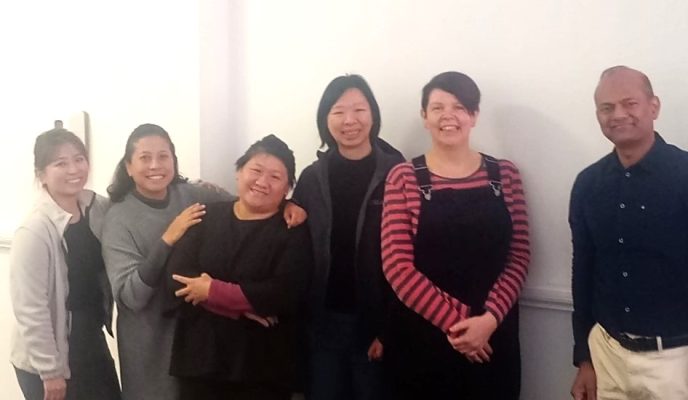With an increase in Bolton of people being diagnosed with dementia Bolton NHS Foundation Trust recognised the need equip their workforce with the knowledge and skills to effectively detect manage and treat delirium within their hospital.
Colleagues at Bolton NHS Foundation Trust (David Neilson Senior Admiral Nurse, Rachael Bridge, Advances Frailty Practitioner and Emma Smith, Clinical Skills Educator Undergraduate Medical Education/ Simulation Lead developed an innovative delirium/dementia simulation training package which aims to increase knowledge and awareness. The training also allows participants to apply the theory they’re taught in a practical simulation session – scenario based. This provides them with a safe space to practise and gives them time to use reflective and critical discussion to measure what they’ve learnt from the scenario. This empowers participants to use the new skills and tools they’ve gained in a variety of clinical areas within the Trust.
The course is aimed at clinicians such as nurses and allied health care professionals who have contact with people living with dementia in their working day. The training include classroom based training and simulation training using three scenarios looking at three different types of delirium, each with varying and different symptoms. The teaching team includes an Admiral Nurse, frailty nurse, simulation officer and a volunteer acting as the patient.
During the simulation training the volunteer, acting as the patient, will act out different scenarios, covering the three different types of delirium. This gives participants the opportunity to apply the knowledge they’ve gained in the classroom based training and apply their critical thinking skills whilst responding to and complying with Trust values and policy:
- Gaining consent and capacity assessment with the ‘patient’ (initial introduction and taking physical observations)
- Constructing an assessment framework such as PINCH ME (Pain, Infection, Nutrition, Constipation, Hydration, Medication, Environment – a mnemonic used to teach clinical staff to look for obvious causes of delirium), 4AT assessment (a brief tool for delirium detection designed for use in clinical practice. It’s the standard tool for delirium detection in many countries.
- Looking at appropriate pain management (medicines assessment/ review to avoid constipation and sedation)
- Involvement of appropriate individuals (family/ carers) and appropriate use of the Getting to know me card (a card designed to be viewed by the bedside, containing some useful information about the person with dementia eg things that matter to the person, people who are important to them etc)
- Letting the ‘patient’ walk when they get up (walking with purpose vs restraint)
- Using the 4AT to determine new cognitive impairment
The clinicians who developed the training also developed a short video which is used a part of the training. The video looks at how to screen for and diagnose delirium and the Do’s and Don’ts in Delirium. It also includes the current screening for delirium in Bolton Hospital’s Emergency Department where all patients aged 65 or over are automatically screened for delirium ensure that the correct pathway is followed. The video is currently used in all types of teaching for various grades including nursing and medical staff. You can view the video here
As part of their visit the Singapore delegates visited Bolton Hospital to find out more about the training. They took part in creating a real life scenario that they might experience in practice but in a simulated setting. During the session they worked together to complete a full assessment and look after a patient with delirium.

The training to date has received very positive feedback and is currently the only one of a few simulation training programmes in Greater Manchester that focuses on delirium and dementia. Overall, ward managers and other colleagues who were spot checked a year they attended the training after felt that the training has improved their practice.
The feedback as part of the feedback for the simulation training has been very positive. It’s something very new for foundation trainees and it`s not the scenario they expect in simulation as they always suspect an emergency or a dying patient. It’s part of emphasising that delirium is a serious condition. They are surprised to hear the mortality is actually higher than myocardial infarction and sepsis. Dr Gopalakrishnan Deivasikamani, Consultant, Elderly Medicine, Bolton NHS Foundation Trust.
The hospital has noticed a marked increase in the “Getting to know me” cards being filled in and being placed on the patient’s bedside locker. There’s also been an increase in the number of clinical staff using 4AT.

